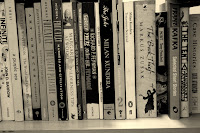
For me, reading has never been an isolated activity. I have always associated a book with the external material circumstances linked with reading - the cover of the book, how I got the book (hours of rummaging through a library or a specific bookstore or gifted by a friend), outside weather, and my disposition as a reader at a given time and stage in my life.
Now, with a Kindle, there is no cover, no physical "form", no old pages, no more hunting through libraries (just search title on amazon and download with one click),
I sometimes grieve for the loss of material aspect of the book. Earlier, when I read paper books, each one had a separate physical identity with a different jacket, size, weight, each having a different odour and procuring a "physical" life of its own in my bookshelf (Samuel Beckett's "Molloy, Malone Dies, Unnamable" soaked in rain and then dried in sun, some pages of Othello's Arden edition smeared with my pink skin allergy...). It was not easy carrying Musil's The Man Without Qualities".
Now, on a Kindle everything is black and white, and customisable - font, spacing, pagination. To my annoyance, some books no longer retain their original author-intended page format and space appropriation vis-a-vis the written text. Where would we fit some of the works of Perec here, all the ambivalence between subjective and objective space?
Yet, I cannot complain. At least, an e-reader like Kindle allows me to "read" again despite low vision. And I shouldn't complain about physical form so much because I cannot read print anyways :P
I sometimes use text-to-speech option on Kindle for non-fiction books when I want to read in bus or in public. Partly to avoid reading in a moving bus or to avoid other people peaking into the page contents or sometimes to avoid a situation when strangers tell me that I shouldn't hold a book so close to my eyes. The narrator in Kindle's text-to-speech utility often ends up skipping essential pauses leading to misinterpretation and confusion. In comparison ZoomText narrator is much advanced. Although, I still find narrator or audio books too intrusive for a solitary activity (reading).
I am also these days a bit annoyed with my brain processing everything wrongly due to limited visual picture that it receives. I misread a lot without knowing that I'm misreading.
How do you manage prolonged reading with low vision? Do you have better solutions?